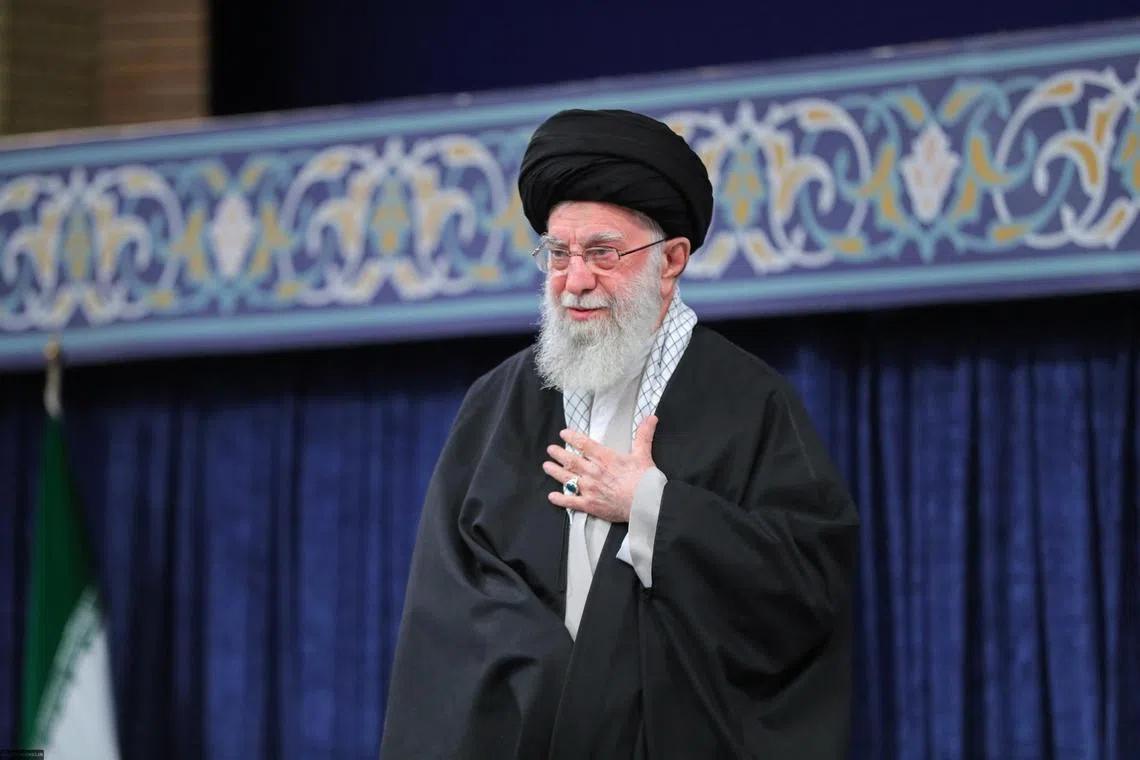Iran’s Khamenei to give rare Friday sermon after attack on Israel
Sign up now: Get ST's newsletters delivered to your inbox

Iranian Supreme Leader, Ayatollah Ali Khamenei, greeting the crowd during a ceremony in Tehran on Oct 2.
PHOTO: EPA-EFE
TEHRAN - Iran’s supreme leader, Ayatollah Ali Khamenei, is set to lead Friday prayers and deliver a public sermon that could shed light on the Islamic republic’s plans after a massive missile attack on enemy Israel.
On Oct 4, Ayatollah Khamenei’s rare Friday sermon – a first in almost five years – comes three days before the one-year anniversary of the Israel-Hamas war in Gaza, triggered by the Iran-backed Palestinian group’s attack on Oct 7, 2023.
The supreme leader, who wields the highest authority in Iran, will lead Muslims in prayer at the Imam Khomeini Grand Mosalla mosque in central Tehran, his official website said.
The prayer will follow “a commemoration ceremony” at 10.30am local time for Hassan Nasrallah, the slain leader of Tehran-backed Lebanese armed movement Hezbollah.
Iran’s Revolutionary Guards, who answer to Ayatollah Khamenei, said Oct 1’s barrages of some 200 missiles were in retaliation for Israel’s killing of Nasrallah
Ayatollah Khamenei last led Friday prayers in January 2020 after Iran fired missiles at a US army base in Iraq, in response to a strike that killed revered Revolutionary Guards commander Qasem Soleimani.
In Tehran on Oct 3, crowds waving Hezbollah and Iran flags gathered outside the former US embassy building in Tehran to denounce Israeli “crimes” in the Gaza Strip and in Lebanon, Iranian media reported.
Ayatollah Khamenei had declared public mourning in Iran for Nasrallah, and on Oct 2 said that the Hezbollah chief’s death was “not a small matter”.
Hamas, Hezbollah and other armed groups in the Middle East are part of the Iran-aligned “axis of resistance” opposed to Israel and its ally the US.
Analysts said Iran’s missile attack – its second-ever directly targeting Israel – was meant to counter a string of setbacks suffered by Tehran and its regional allies.
Iran has said this week’s attack
The Islamic republic has also warned the US – Israel’s top arms provider – against intervening, threatening “a harsh response” if it did.
Washington has said Iran must suffer “consequences”, which may be coordinated with Israeli officials, for the ballistic missile fire.
US President Joe Biden said Oct 3 he was discussing possible Israeli strikes
In April, Tehran had sent missiles and drones against Israel in retaliation for a deadly Israeli strike on Iran’s consulate in Damascus.
In both attacks, nearly all missiles were intercepted by Israel or its allies, according to the Israeli authorities. AFP


